2018 edit- this survey is now outdated. Autistic Not Weird now has a new survey which features more in-depth analysis, more reliable results, and 11,521 respondents instead of 477.
I’ll keep this article here for reference, but there’s no point in reading it anymore now that the 2018 survey exists.
Here it is- the most laborious article I have ever written. But also an important one.
There are a lot of clichés that go around about autistic people or families affected by autism. Some of these include the following which I have heard plenty of times:
- “Autistic people are good at maths.”
- “Most autistic people don’t want a cure, but their parents do.”
- “Autistic people prefer the phrase “autistic people”, but non-autistic people prefer the phrase “people with autism”.”
- “Autistic people are usually atheists.”
- “There aren’t many people who believe that vaccines cause autism, but they tend to be the louder group.”
Having a degree in mathematics, I’m no stranger to statistical manipulation (which isn’t as dodgy as it sounds, I promise). So I decided to assess how true some of these clichés were, in the only way a mathematician knows how.
Data!
So I set up a survey and shared it, encouraging anyone affected by autism to complete it. It got 477 responses. Enough to be a nice little indicator of general opinion, even if not enough to use as scientific proof. (And, in all fairness, getting 477 people to complete an autism-specific survey isn’t a bad achievement when all you have is a Facebook page.)
The survey asked the following questions:
- Are you personally on the autism spectrum?
- Are you related to someone on the autism spectrum (not including yourself)?
- Where do you live?
- May I ask your age?
- Did you find this survey through following Autistic Not Weird?
- Please indicate how strongly you agree or disagree with the following statements.
- Other people don’t understand enough about autism.
- Generally speaking, I like children.
- I take advice online from other autistic people or their relatives.
- I prefer ‘person with autism’ to ‘autistic person’.
- Pizzas taste nicer than burgers.
- My (or my relative’s) school knows/knew how to accommodate my (or my relative’s) needs.
- I have religious faith.
- I use ‘mild’, ‘moderate’ and ‘severe’ as autism-related adjectives.
- I am happy to discuss my/my relative’s autism with other people.
- I prefer cats to dogs.
- Autism has taken away from my life rather than added to it.
- I frequently disagree with other autistic people (or other autism parents) about autism-related issues.
- I am good at maths.
- If a cure for autism existed, I would take it/give it to my relative.
- I use the phrase ‘high-functioning’.
- I am concerned about a potential link between vaccines and autism.
- I want the best for other people’s autistic children.
- I am at peace with my autism (or my relative’s autism).
- Please tick the boxes that describe how your autism affects you (or your relative’s autism affects them).
- Options were: Academic learning difficulties; Anxiety and/or depression; Enhanced memory; Social difficulties; Musical ability; Need for routine; Enhanced mathematical skills; Difficulty coping with school/college; Employment difficulties; Enhanced creativity; Family struggles; Sensory issues; ‘Geekiness’; Coeliac disease or other digestive issues; OCD or other neurological conditions; Enthusiasm for special interests/‘obsessions’; Other (please specify).
- Name up to three famous autistic people, if you can.
- If you could teach people one thing about autism, what would it be?
Some of the results surprised me. Others were very predictable.
(Note: the final question: “If you could teach people one thing about autism, what would it be?” contained so many brilliant answers that I gave it an article of its own.)
Opening questions
Just to give the rest of the answers a little context.

And combining the answers to these two questions:
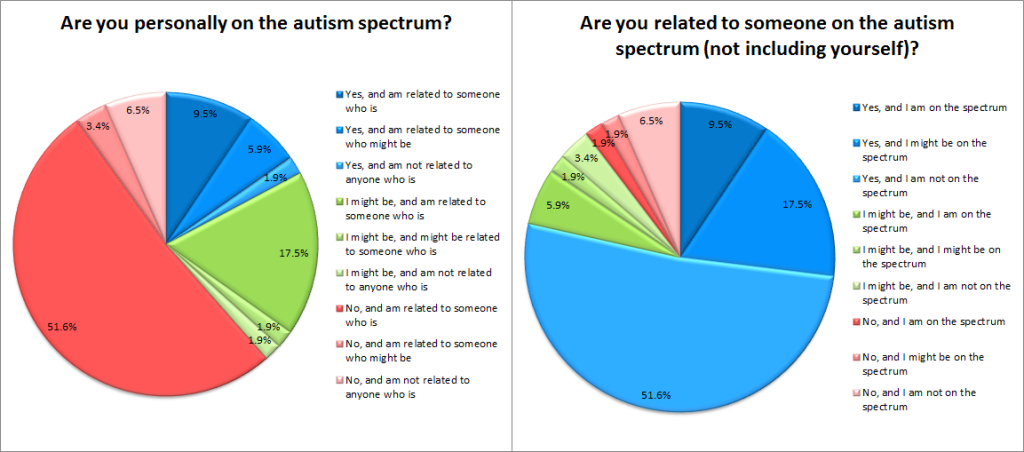
Some purists may not be happy that only 17% of the respondents to this survey were on the autism spectrum (although the figure may be as high as 40%). But I’m not sad at all. Partly because getting 1% of the general population to be 17-40% of your data is pretty good; partly because non-autistic people can know a ton about autism too; and partly because the autistic/non-autistic comparisons will be so interesting to read later.
Also, a big share of respondents (17.5%) were related to an autistic person and thought they may be on the spectrum too. Personally, I have heard a lot of autism parents say the same thing.
Finally, I found it interesting that 6.5% (31 people) had no trace of autism in their family, and still found the subject interesting enough to take part in the survey. (I suspect they may have autistic friends, students, patients and so on.)
A few other basic graphs for context:

This is nearly but not quite representative of my followers on Autistic Not Weird’s Facebook page, where the survey was shared. I was expecting a larger share of North Americans here, and just a couple more Europeans.


Honestly, I wasn’t expecting over a fifth to have come from somewhere external.
And now the interesting stuff…
Starting with the agree/disagree questions. They yielded very interested results, and some are especially interesting when you compare autistic people’s answers to non-autistic people’s.
Let’s start with something that the vast majority seem to agree on:
Autism and public understanding

Yep, 96.5% of the people who took this survey believed other people don’t understand enough about autism. Clearly, more awareness is still needed.
But, as the next graph indicates, this isn’t for lack of trying.

I made four graphs for this question: the graph above, autistic respondents only, non-autistic respondents only, and “I might be” respondents only. All four graphs looked almost exactly the same. (Incidentally, to the 78% of autistic people who clicked “agree”/”strongly agree”, thank you. I spent far too long not being one of you. But I’d like to think I’m making up for it now.)
But what about schools?
As a former teacher myself, I like to think that the tide is absolutely turning in the right direction. We’ve come a long way from me at 10 being recorded by a professional as having a “slightly odd personality”, to half the teaching staff I worked with informally diagnosing me as an adult.
Non-autistic people, by and large, appear to share my positivity.

However, autistic people themselves seem less positive. Bear in mind though, given the age range of the respondents, most answers will have come from people who were at school several decades ago.
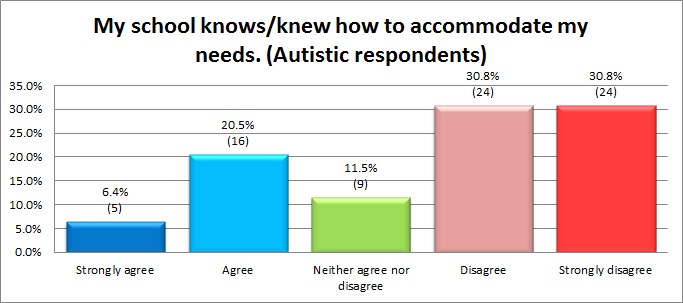
I also narrowed this graph down to the autistic respondents aged 14-19. There were only seven of them, and their results were 1/2/1/2/1. Those aged 20-29 gave the results 2/5/1/5/8. I’d love to ask the same question again with a meaningful sample size, to see if we are in fact going in the right direction.
Autism and religion
I’m often led to believe that a higher proportion of autistic people tend to be atheists. (Plenty of times I’ve thought, as a Western European middle-class male with Asperger Syndrome and a degree in mathematical sciences, that I should have been first in line. I tick every box.)
Non-religious people may claim that autistic people’s leanings are due to their more ‘logical’ thought process. Religious people may claim it’s due to difficulties understanding abstract concepts. But I find both arguments distasteful, so rather than letting those two autistic stereotypes produce a third autistic stereotype, here is what our autistic respondents had to say:
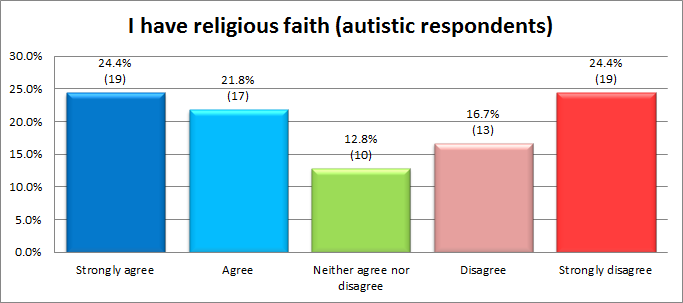
Comparing this to non-autistic respondents:
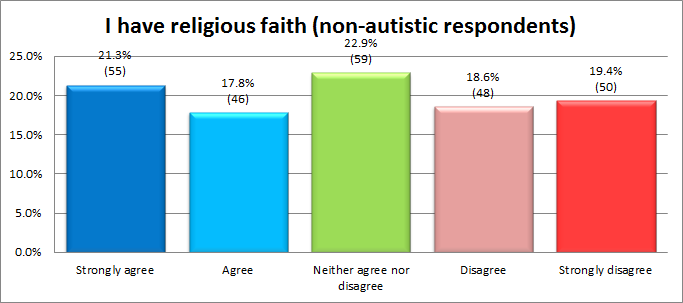
I won’t lie, this surprised me. Looks like the stereotype could be wrong.
I did, however, find a much stronger indicator of religious leanings.

I’ve heard a lot of atheists claim that Americans are only religious because they were born in a religious country. They get a little surprised when I suggest- by their own logic- that they are only non-religious because they were born in 21st Century Britain.
So, even with a sample size of under 500, the data does seem to indicate that your homeland is a much stronger influence on your religious beliefs than whether or not you’re autistic.
Language choices
Like I said earlier, the cliché is that non-autistic people prefer the phrase “person with autism”, getting offended by the phrase “autistic person”- and it’s the other way round for those on the spectrum.
Well, let’s see what the data said.
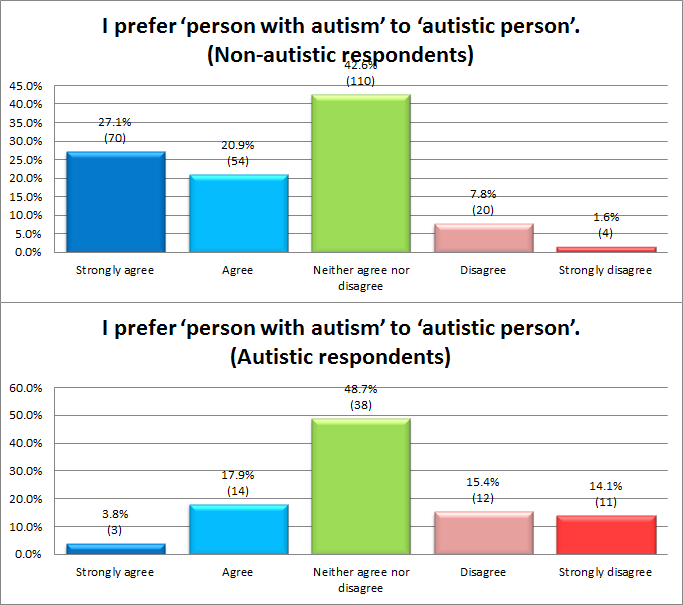
Although “autistic person” has a mild advantage in the second graph, the sample size is too small for this to be significant. As it stands, this seems to indicate that people on the spectrum don’t care half as much as people off the spectrum. As Erin, one of my followers, said recently:
I asked my 11 year old if he preferred we say “is autistic” or “has autism”. He looked at me like I was crazy and told me those two statements meant the same thing.
Meanwhile, there’s the use of the phrases ‘mild’, ‘moderate’ and ‘severe’:

And the (apparently) polarising phrase “high-functioning”.

Almost half of the “strongly disagree”s came from autistic people (who only made up 17% of the respondents).
It seems the phrase isn’t quite as divisive as I’d been led to believe. That said, a disproportional amount of disagreements came from autistic people themselves. Make of that what you will.
Of course, language choices are quite a sore point among quite a lot of people (although in my opinion, the ferocity of the debate does more harm than good). For those who are interested, I sum up the arguments for and against each of the major terms in a separate article (opens in new window).
Putting a stereotype to rest
So, the maths question.

These results surprised me, and not just because there’s so little difference between the autistic and non-autistic groups. Most of the people on the spectrum I’ve worked with have either been brilliant at maths or have had various levels of learning difficulties. I guess I was expecting the autistic people’s data to be split between the extremes.
Note: speaking as a former teacher specialising in maths, there is a huge difference between ability and confidence. If people are given a chance to doubt themselves they usually take it (and never mind a diagnosis of something- social inadequacy alone is often enough to make you doubt your academic skills). So plenty who answered this question may actually be better than they think.
The third graph may not be statistically significant, but it does make me wonder- do some of these people’s mathematical skills play a part in them wondering about their own autism?
The slightly more upsetting questions
Ok… let’s take a look at these four graphs. Compare them horizontally (non-autistic v autistic), but also compare them vertically (each section’s answers to both questions). Analyse them for a while and see what conclusions you make.

Personally, the things which stand out to me:
- Among the non-autistic community, the theoretical ‘cure’ issue really is as divisive as you think it is. Although roughly 50% more agreed than disagreed.
- But the stereotype seems to be true: autistic people generally do not want a cure. Plenty really don’t want one.
- 97 non-autistic people would give their relative a cure- but mathematically, at least 66 of them did not disagree with “I am at peace with my relative’s autism.” (To me this begs the question “then why on Earth would you want a cure?!”)
- Mathematically, at least five non-autistic people (although likely more) agreed/strongly agreed with both statements. This does not make sense to me.
- Overall, autistic people are a lot less negative about their autism than we are often led to think. Yes, we may have our fair share of issues, but most of us seem fine with our identity thank you very much.
I’ll finish this section with (in my opinion) the most emotionally difficult question of all.

The mathematical differences in the autistic respondents’ answers are as follows:
- Strongly agree: +9.7%
- Agree: -3.0%
- Neither agree nor disagree: -7.7%
- Disagree: -3.7%
- Strongly disagree: +4.7%
Does this mean that autistic people generally dislike their autism more than their relatives? I’m not convinced, given the answers to the previous questions.
However, it does appear that autistic people are more polarised in their opinions of how their autism affects them.
The ‘V’ word
Given my personal opinions towards vaccine refusers- those who seem to fear having an autistic child more than a dead one, and how hurt I feel by the swathes of parents who are afraid of their children turning out like me (or even “worse”, like the awesome students I used to work with)- I don’t think I’m the right person to annotate this data. I will simply show the charts.

A few fun ones to lighten the mood
I threw in a couple of non-autism-specific questions too. I didn’t really have an outcome in mind (besides wondering how divisive the minor things like cats v dogs were compared to the more serious issues). I just thought it would be fun to collect the data anyway and see if anything interesting could be made from it.
For those who are curious, here are the results.

1) Autistic people don’t like kids as much as everyone else.
2) No matter what kind of brain you have, pizzas are better than burgers.
3) People with autism are more cat people than dog people.
But, like I said, data size and all.
And one important lesson…
Everyone knows the autism community often argues. Ferociously. Whether it’s about medicines, ABA, or the controversial issues above (including which words are supposed to be offensive to us and which aren’t), the arguments often get fierce.
But we still seek guidance from one another.

And although we are known for frequent disagreements, plenty of us don’t take part.
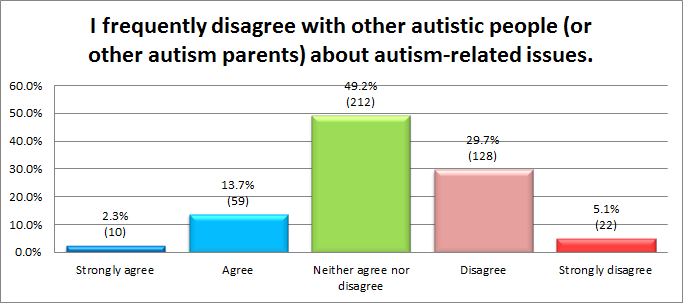
And by far the most important thing I can highlight… we are all on the same side.

49 in every 50 people agreed with this statement. And not one single person disagreed.
So next time you get into an argument with a stranger over the internet, make sure you bear in mind that they want the best for other people’s children too. Just like you do.
And that’s the end of the agree/disagree questions. I think it’s a nice note to leave it on.
How does your autism affect you?
I asked people to tick all the boxes that applied to them. The results made interesting reading.

…Should I feel comforted that 83% of people ticked anxiety too, or should I feel guilty that it’s comforting?
I suppose it was predictable that “social difficulties” was going to end up on top. Autism is, after all, a social development disorder. Hearty congratulations to the 3.4% of respondents who did not report social difficulties!
Others specified (not that I can include all 84) included:
- Too many to mention
- Communication difficulties [lots of people said this.]
- Desperate to fit in but not sure of the rules
- Particular about food
- Little sense of responsibility and danger
- Being bullied because he is different [why on Earth did I forget to put bullying as an option?]
- PTSD as a result of severe bullying
- Self harm
- Attentiveness to detail
- Frustration at being misunderstood
- Stimming
- Enhanced logical thinking which makes me very good at my work (Management Information)
- No respect for personal space/boundaries
- Problem solving, tenacity
- Amazing perception of world around him
- ADHD
- SPD
- Epilepsy
- Hyperlexia; enhanced sense of smell & sound
- Discalculia
- PDA
- Synesthesia
- Potential bipolar
- Meltdowns when asked to do something creative, but does exact same things alone with no issue.
- Intolerance of ‘normal’ social idiocies, such as lying
- Sleep issues [again, several people]
- Non-verbal
- Non stop talking
- Mental 3D manipulation of mechanical schematics [haha, nice one!]
- Intense ability to communicate with animals
- Awesomeness
Name up to three famous autistic people, if you can.
When I set this question, I had no idea how arduous my job would end up being: both compiling the results into a readable format, and researching almost every single name to check whether they actually were autistic.
After going through each answer individually, combining all the results for each individual person (including the multitude of spellings for Dan Aykroyd!), this is the table that came out.
Important note: a person’s appearance on this list does not confirm that they are actually autistic. This is simply a report of how people answered the survey. See my own annotations for each person.
| 145 votes | Dr Temple Grandin | Autism speaker, author, and professor of animal science. | Famously autistic. |
| 133 | Albert Einstein | Famous scientist (in case you’ve never heard of him). | Never formally diagnosed with Asperger’s but undoubtedly would have been. |
| 82 | Daryl Hannah | Actress (Blade Runner, Kill Bill, etc.) | Has publicly opened up about her autism. |
| 74 | Dan Aykroyd | Actor (Ghostbusters, Blues Brothers, etc.) | Has publicly opened up about his Asperger’s. |
| 50 | Bill Gates | Founder of Microsoft. | Asperger’s suspected but not officially confirmed. |
| 34 | Susan Boyle | Singer | Has publicly opened up about her Asperger’s. |
| 15 | Wolfgang Amadeus Mozart | Classical composer | Strongly suspected to have had Asperger Syndrome. |
| 12 | John Elder Robison | Autism activist, author | Well known for being Autism Speaks’ only ever autistic board member. |
| 12 | Steve Jobs | Founder of Apple | Suspected by many to have had Asperger’s, but not confirmed. |
| 10 | Tim Burton | Director | Suspected to have been autistic, but not confirmed. |
| 9 | Chris Bonnello | Er… me. | Wow, thanks guys! Does this mean I’m officially famous now? |
| 8 | Isaac Newton | Scientist. Duh. | Obviously not diagnosed during his life, but likely to have had Asperger’s. |
| 5 | Courtney Love | Singer, Kurt Cobain’s widow | Diagnosed as “mildly autistic” as a child. |
| 5 | Satoshi Tajiri | Creator of Pokémon | Widely reported to have Asperger Syndrome. |
| 4 | Robin Williams | Comedian, actor | Suspected to have had Asperger’s by some, not confirmed. |
| 4 | Gary Numan | Singer | Diagnosed with Asperger’s as an adult. |
| 4 | Kim Peek | Savant, inspiration for the character of ‘Rain Man’ | Ironically, Peek wasn’t actually autistic. |
| 4 | Stanley Kubrick | Director | Suspected by many to have had Asperger’s, not diagnosed during lifetime. |
| 4 | Mark Zuckerberg | Creator of Facebook | Reputed to have Aspie traits, reported by a colleague to have “a touch of the Asperger’s”. Not diagnosed. |
| 4 | Jerry Seinfeld | Comedian | Claimed to be on the spectrum, then backtracked on the statement two weeks later. |
| 3 | Alan Turing | Scientist/mathematician who broke the Nazis’ code during World War 2. | Suspected by many to have had Asperger’s, not diagnosed during his lifetime. |
| 3 | Andy Warhol | Artist | Suspected to have been autistic, but not confirmed. |
| 3 | Richard Branson | CEO of Virgin | Mockingly referred to as being autistic by Ryanair CEO. Diagnosed dyslexic. |
| 3 | Nikola Tesla | Scientist | Never formally diagnosed with Asperger’s but most likely would have been. |
| 3 | Vincent Van Gogh | Artist | Suspected by some to have had autism, no diagnosis existed during his lifetime. |
| 3 | Dr Sheldon Cooper | Fictional character in “The Big Bang Theory” | Never confirmed by show’s creators, although often seen as a poster boy for high-functioning Asperger Syndrome. |
| 3 | Leonardo da Vinci | Artist, inventor | Widely considered to have had Asperger Syndrome. |
| 3 | Steven Wiltshire | Architectural artist | Diagnosed autistic aged 3. |
| 2 | Abz Love | Member of the boy band “Five” (or “5ive”) | (Woah, that’s news to me!)
Opened up about having Asperger’s on Celebrity Big Brother. |
| 2 | Thomas Edison | Inventor | Widely considered to have had Asperger Syndrome. |
| 2 | Bill Murray | Actor (Groundhog Day, etc.) | Has reportedly announced that he has Asperger Syndrome. |
| 2 | Lionel Messi | Footballer (or soccer player, if you must) | Diagnosed with Asperger Syndrome aged 8. |
| 2 | Donna Williams | Author, artist, screenwriter | Very openly autistic. |
| 2 | Rudy Simone | Author, speaker | Very openly autistic. |
| 2 | Thomas Jefferson | Former American president | Considered by some to have been on the autism spectrum. |
| 2 | Naoki Higashida | Author of “The Reason I Jump” | Very openly autistic. |
| 2 | Michael Palin | Comedian, documentarian | Suspected Asperger’s, but not confirmed. |
| 2 | Roy Cropper | Fictional character, Coronation Street | Actor David Neilson deliberately portrays him as having Asperger’s. |
| 2 | Ari Ne’eman | Autism activist, cofounder of Autism Self-Advocacy Network | Very openly autistic. |
| 2 | Steve Silberman | Autism author, journalist, speaker | As far as I am aware, I have seen no suggestion that he is personally on the autism spectrum. |
| 2 | Daniel Tammet | Writer, author of “Born on a Blue Day” | Very openly autistic. |
Names mentioned once (who are on the autism spectrum):
Alex Olinkiewicz, Alex Plank, Amy Sequenzia, Amythest Schaber, Anne Heggarty, David Byrne, David Finch, Emma Goodall (the author, not the pink Power Ranger), Jacob Barnett, Jennifer O’Toole, Ladyhawke, Liane Holliday-Willey, Max Braverman (fictional), Michelle Dawson, Paddy Considine, Rain Man (fictional), Sarah Hendrickx, Sean Barron, Stephen Shore, Tim Fischer, Tim Page, Tom Bowes (wow, one of my friends made it on here!), Tori Lion, Will.I.Am, William Stillman.
Names mentioned once (who are suspected by some to be/have been on the autism spectrum):
Alfred Hitchcock, Brian Wilson, Charles Darwin, David Helfgott, Ed Sheeran, Eminem, Linus Torvalds, Ludvig van Beethoven, Mitt Romney.
Names mentioned once (who are not known to be on the autism spectrum):
(If one of your answers appears here and you really believe the person to be autistic, please don’t interpret this as dismissal. I’m only willing to put names in the above categories after personally seeing some evidence. I will edit this section if reliable sources can be found.)
Alec Baldwin, Donald Trump, Dustin Hoffman, Gwyneth Paltrow, Hans Asperger, James Dyson, Jim Carrey, Johann Sebastian Bach, Magic Johnson, Mark Kermode, Mike Oldfield, Oliver Sacks, Prof. Stephen Hawking, Steven Spielberg.
Which leaves just one final question:
If you could teach people one thing about autism, what would it be?
Honestly, I was planning on having this whole survey done in one part. But this question had 373 individual answers. And I realised I had a choice between selecting just a few to tack onto the end of this (already lengthy) article, or I could save them all for an article on their own.
Conclusions
I’ve made quite a few references to the data size not being large enough, but honestly that’s just me thinking like a mathematician.
Because 477 responses is fairly incredible when all you have is a Facebook page- and (at best) only about a third of your followers see each post. (Anyone who’s reading this- it may be better to visit the page itself once in a while, rather than expecting every post to appear in your news feed. Because they don’t.)
So first things first, thank you to everyone who shared their insights (and shared the survey itself!)- it has both satisfied my curiosity and helped me to quantify all those opinions I’ve heard during my time in the autism community. Because real data beats anecdotal data any day.
I’ll finish with a couple of things I personally took from this whole episode.
- People are more positive about schools’ ability to provide for autistic children than I previously thought.
- The desire for a theoretical ‘autism cure’ really is a non-autistic thing.
- Religious leanings do not appear to be affected by being on the autism spectrum.
- Despite its wide-ranging opinions, most people in the autism community are after the same noble goals.
- Abz from 5ive is autistic. Honestly, I had no idea.
- Finally, autistic people appear to be:
- Less fussy about language than I thought;
- Less negative than they are often portrayed;
- Often more polarised in their opinions on autism-related issues;
- Apparently more likely to be cat people!
Feel free to leave your own insights and interpretations in the comments. There’s bound to be things that I missed!
Chris
-Chris Bonnello is a national and international autism speaker, available to lead talks and training sessions from the perspective of an autistic former teacher. For further information please click here (opens in new window).
 Chris Bonnello on LinkedIn
Chris Bonnello on LinkedIn
Autistic Not Weird on Facebook
Autistic Not Weird on YouTube
Autistic Not Weird on Instagram

Copyright © Chris Bonnello 2015-2024
Underdogs, a near-future dystopia series where the heroes are teenagers with special needs, is a character-driven war story which pitches twelve people against an army of millions, balancing intense action with a deeply developed neurodiverse cast.
Book one can be found here:
Amazon UK | Amazon US | Amazon CA | Amazon AU
Audible (audiobook version)
Review page on Goodreads
Picture credits:
All charts by me (via Microsoft Excel).
Scientist picture by someone on quickmeme.com.


 Are you tired of characters with special needs being tokenised and based on stereotypes, or being the victims rather than the heroes? This novel series may interest you!
Are you tired of characters with special needs being tokenised and based on stereotypes, or being the victims rather than the heroes? This novel series may interest you!
Recent Comments